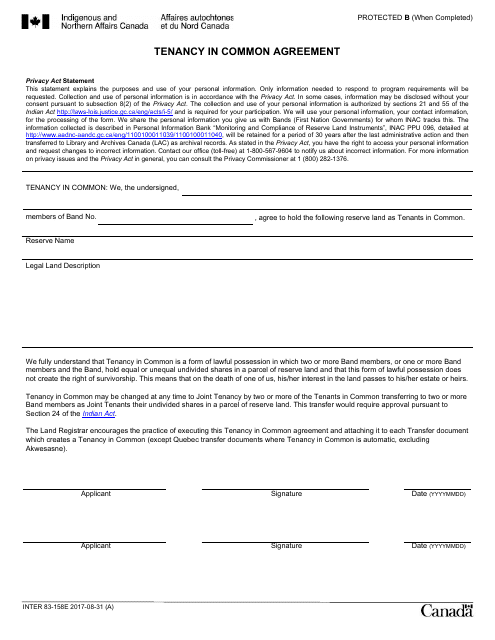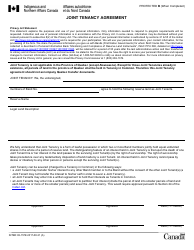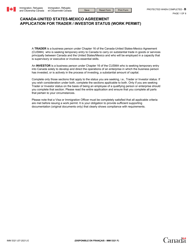Form INTER83-158E Tenancy in Common Agreement - Canada
Form INTER83-158E Tenancy in Common Agreement in Canada is a legal document used to establish the co-ownership of property between two or more individuals or entities. It outlines the rights, responsibilities, and division of ownership interests among the co-owners.
The Form INTER83-158E Tenancy in Common Agreement in Canada is typically filed by the individual(s) who wish to create a tenancy in common arrangement.
FAQ
Q: What is the INTER83-158E Tenancy in Common Agreement?
A: The INTER83-158E Tenancy in Common Agreement is a legal document that establishes the ownership arrangement between multiple individuals who own a property together as tenants in common in Canada.
Q: What is the purpose of a Tenancy in Common Agreement?
A: The purpose of a Tenancy in Common Agreement is to define the rights and responsibilities of each co-owner, including their share of ownership, contributions, and how the property will be managed and divided.
Q: Who should use the INTER83-158E Tenancy in Common Agreement?
A: The INTER83-158E Tenancy in Common Agreement can be used by individuals in Canada who wish to own a property with others as tenants in common.
Q: How is tenancy in common different from joint tenancy?
A: In a tenancy in common, each co-owner has a distinct and separate share of ownership, while in joint tenancy, the co-owners have equal and undivided shares of ownership.
Q: What should be included in a Tenancy in Common Agreement?
A: A Tenancy in Common Agreement should include the names and contact information of the co-owners, their respective shares of ownership, details of their contributions, provisions for property management and maintenance, and procedures for dispute resolution and division of the property.
Q: Is a Tenancy in Common Agreement legally binding?
A: Yes, a Tenancy in Common Agreement is legally binding in Canada as long as it meets the requirements of a valid contract, such as mutual consent and consideration.
Q: Can a Tenancy in Common Agreement be modified or terminated?
A: Yes, a Tenancy in Common Agreement can be modified or terminated by the co-owners through a written agreement or by seeking legal remedies, such as a court order.
Q: Do I need a lawyer to create a Tenancy in Common Agreement?
A: While it is not required to have a lawyer, it is recommended to seek legal advice when creating a Tenancy in Common Agreement to ensure that all relevant legal aspects are addressed and that the agreement is enforceable.
Q: Can the INTER83-158E Tenancy in Common Agreement be used outside of Canada?
A: The INTER83-158E Tenancy in Common Agreement is specifically designed for use in Canada, so its applicability outside of Canada may vary. It is advisable to consult local legal professionals in other jurisdictions.
Q: What are the consequences of not having a Tenancy in Common Agreement?
A: Without a Tenancy in Common Agreement, the co-owners may face uncertainties and potential disputes regarding their respective rights, obligations, and division of the property.
Q: Can a Tenancy in Common Agreement be enforced if one co-owner violates its terms?
A: Yes, a Tenancy in Common Agreement can be enforced through legal remedies if one co-owner violates its terms. This may involve seeking a court order for compliance or seeking damages for breach of contract.
Q: Can a Tenancy in Common Agreement be used for commercial properties?
A: Yes, a Tenancy in Common Agreement can be used for both residential and commercial properties in Canada.
Q: What happens if one co-owner wants to sell their share of the property?
A: If one co-owner wants to sell their share of the property, they can do so, but the other co-owners may have the right of first refusal to purchase the share before it can be sold to an external party.
Q: How can disputes between co-owners be resolved under a Tenancy in Common Agreement?
A: Disputes between co-owners can be resolved through the dispute resolution provisions outlined in the Tenancy in Common Agreement, such as mediation or arbitration. If unresolved, legal remedies, such as court proceedings, may be pursued.
Q: What happens to a Tenancy in Common Agreement if one co-owner passes away?
A: If one co-owner passes away, their share of ownership in the property will be distributed according to their will or the laws of intestacy if there is no will. The Tenancy in Common Agreement will still govern the rights and responsibilities of the remaining co-owners.
Q: Is a Tenancy in Common Agreement the same as a partnership agreement?
A: No, a Tenancy in Common Agreement is different from a partnership agreement. A Tenancy in Common Agreement is specifically for co-ownership of property, while a partnership agreement governs the relationship between individuals in a business venture.
Q: What is the duration of a Tenancy in Common Agreement?
A: The duration of a Tenancy in Common Agreement is typically indefinite, meaning it does not have a specific end date unless stated otherwise in the agreement.
Q: Can the INTER83-158E Tenancy in Common Agreement be customized?
A: Yes, the INTER83-158E Tenancy in Common Agreement can be customized to fit the specific needs and preferences of the co-owners, but it is advisable to seek legal advice when making modifications.
Q: Are there any legal requirements for witnessing or notarizing a Tenancy in Common Agreement?
A: The requirements for witnessing or notarizing a Tenancy in Common Agreement may vary depending on the jurisdiction. It is advisable to consult local legal professionals to determine the specific requirements in your area.
Q: What if I want to convert a Tenancy in Common Agreement to joint tenancy?
A: To convert a Tenancy in Common Agreement to joint tenancy, the co-owners would need to create a new agreement that reflects the change in ownership structure and legally transfer their respective shares to reflect the joint tenancy arrangement.
Q: Can a Tenancy in Common Agreement be used for unequal shares of ownership?
A: Yes, a Tenancy in Common Agreement can be used to establish unequal shares of ownership, where each co-owner's proportion of ownership reflects their agreed contribution or investment in the property.
Q: Does a Tenancy in Common Agreement need to be registered with a government agency?
A: Generally, a Tenancy in Common Agreement does not need to be registered with a government agency. However, it is advisable to check the local laws and regulations regarding property ownership and registration in your jurisdiction.
Q: What is the cost of creating a Tenancy in Common Agreement?
A: The cost of creating a Tenancy in Common Agreement can vary depending on the complexity of the agreement and whether legal assistance is sought. It is advisable to budget for legal fees or document preparation services.
Q: Can a Tenancy in Common Agreement be used for personal or familial relationships?
A: Yes, a Tenancy in Common Agreement can be used for personal or familial relationships, such as friends, relatives, or unmarried couples, who wish to co-own a property together.
Q: Can a Tenancy in Common Agreement be used for vacation properties?
A: Yes, a Tenancy in Common Agreement can be used for vacation properties, allowing multiple co-owners to share the expenses and responsibilities of owning and maintaining the property.
Q: Can a Tenancy in Common Agreement be used when one co-owner resides in another country?
A: Yes, a Tenancy in Common Agreement can be used when one co-owner resides in another country, but it is important to consider any additional legal implications or tax obligations that may arise.
Q: Can a Tenancy in Common Agreement be used for land or real estate development projects?
A: Yes, a Tenancy in Common Agreement can be used for land or real estate development projects, outlining the co-owners' respective interests, contributions, and responsibilities in the project.
Q: Can a Tenancy in Common Agreement be transferred to a new owner if the property is sold?
A: No, a Tenancy in Common Agreement does not automatically transfer to a new owner if the property is sold. The new owner would need to enter into a new agreement with the remaining co-owners or create a new ownership arrangement.
Q: Can a Tenancy in Common Agreement be used for multiple properties?
A: Yes, a Tenancy in Common Agreement can be used for multiple properties, allowing co-owners to have a joint ownership arrangement for more than one property.
Q: Can a Tenancy in Common Agreement be used for investment properties?
A: Yes, a Tenancy in Common Agreement can be used for investment properties, enabling multiple investors to co-own and share the returns and risks associated with the property.
Q: What is the difference between a deed and a Tenancy in Common Agreement?
A: A deed is a legal document that transfers ownership of a property, while a Tenancy in Common Agreement establishes the rights and responsibilities of co-owners who already own the property.
Q: Can a Tenancy in Common Agreement be used for inheritance purposes?
A: While a Tenancy in Common Agreement can outline the co-owners' intentions for inheritance, it does not override the laws of intestacy or a valid will. It is recommended to consult an estate planning professional for specific inheritance considerations.
Q: Can a Tenancy in Common Agreement be used for temporary or short-term co-ownership arrangements?
A: Yes, a Tenancy in Common Agreement can be used for temporary or short-term co-ownership arrangements, specifying the duration and conditions of the arrangement.
Q: What happens if a co-owner defaults on their financial obligations?
A: If a co-owner defaults on their financial obligations, such as mortgage or maintenance payments, the other co-owners may need to cover the costs or seek legal remedies to address the defaulting co-owner's share of responsibilities.
Q: Can a Tenancy in Common Agreement be used for non-residential properties?
A: Yes, a Tenancy in Common Agreement can be used for non-residential properties, such as commercial buildings or agricultural land, allowing multiple co-owners to share ownership and related rights and obligations.
Q: Can a Tenancy in Common Agreement be used for co-ownership with more than two individuals?
A: Yes, a Tenancy in Common Agreement can be used for co-ownership with more than two individuals, allowing multiple co-owners to establish their respective shares of ownership and other provisions.
Q: What happens if one co-owner wants to buy out the shares of the other co-owners?
A: If one co-owner wants to buy out the shares of the other co-owners, they can negotiate a price and terms with the other co-owners, as long as it is mutually agreed upon by all parties.
Q: Can a Tenancy in Common Agreement be used for co-ownership between family members and unrelated individuals?
A: Yes, a Tenancy in Common Agreement can be used for co-ownership between family members and unrelated individuals, as long as all parties agree to the terms and conditions of the agreement.
Q: Can a Tenancy in Common Agreement be used to specify the purpose or restrictions of the property?
A: Yes, a Tenancy in Common Agreement can include provisions to specify the purpose or restrictions of the property, such as designated uses or limitations imposed by local regulations.
Q: Can a Tenancy in Common Agreement be used to allocate tax obligations among co-owners?
A: Yes, a Tenancy in Common Agreement can specify the allocation of tax obligations among co-owners, such as property taxes, depending on their respective shares of ownership or other agreed-upon arrangements.
Q: Can a co-owner be removed from a Tenancy in Common Agreement?
A: A co-owner can be removed from a Tenancy in Common Agreement if all parties agree to amend the agreement or if a court order is obtained due to violation of the agreement or other legal grounds.
Q: Is it necessary to disclose a Tenancy in Common Agreement to potential buyers of the property?
A: While it is not a legal requirement to disclose a Tenancy in Common Agreement to potential buyers, it is generally advisable to provide relevant information about the property's co-ownership arrangements to avoid any misunderstandings or disputes.
Q: Can a Tenancy in Common Agreement be used for co-ownership between businesses?
A: Yes, a Tenancy in Common Agreement can be used for co-ownership between businesses, specifying the respective rights, obligations, and shares of ownership of the co-owning business entities.
Q: What happens if one co-owner defaults on their mortgage payments?
A: If one co-owner defaults on their mortgage payments, it can potentially affect the other co-owners since they are jointly responsible for the mortgage. The lender can seek remedies against all co-owners to recover the outstanding amount.
Q: Can a Tenancy in Common Agreement be used for co-ownership between spouses or partners?
A: Yes, a Tenancy in Common Agreement can be used for co-ownership between spouses or partners who want to establish separate shares of ownership and clarify their rights and obligations regarding the property.
Q: Can a Tenancy in Common Agreement be used for co-ownership of a condominium?
A: Yes, a Tenancy in Common Agreement can be used for co-ownership of a condominium, addressing the co-owners' rights and responsibilities regarding the unit and the shared common areas.
Q: Can a Tenancy in Common Agreement be used for co-ownership of a mobile home?
A: Yes, a Tenancy in Common Agreement can be used for co-ownership of a mobile home, outlining the co-owners' respective shares of ownership and related obligations.
Q: Can a Tenancy in Common Agreement be used for co-ownership of a rental property?
A: Yes, a Tenancy in Common Agreement can be used for co-ownership of a rental property, specifying the sharing of rental income, expenses, and management responsibilities among the co-owners.
Q: Can a Tenancy in Common Agreement be used for co-ownership of a farm?
A: Yes, a Tenancy in Common Agreement can be used for co-ownership of a farm, defining the co-owners' rights, responsibilities, and potentially addressing specific farming-related matters.
Q: Can a Tenancy in Common Agreement be used for co-ownership of a commercial building?
A: Yes, a Tenancy in Common Agreement can be used for co-ownership of a commercial building, outlining the respective shares of ownership, obligations, and potentially addressing commercial leasing arrangements.



